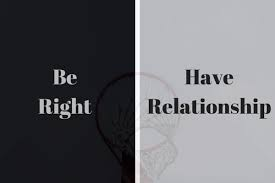~Francine Shapiro
Saturday, March 23, 2024
EMDR
~Francine Shapiro
Thursday, February 22, 2024
fast thinking
~anonymous
Fast on ideas rather than things so as not to allow your own thoughts to consume you. This is after all the purpose of fasting, isn't it? Freedom, not weight loss or a buff physique*.
*The popular "intermittent fast" may actually feed addiction by indulging restrict-binge cycles that reinforce craving rather than freedom.
Sunday, February 11, 2024
I'd rather be safe
There is a saying that goes, "Either you're right or you're in a relationship." I first came across it during Imago Therapy training. My supervisor printed it on a magnet and stuck it on her filing cabinet.
The gist of the expression, and why it is relevant to couples, is that you cannot maintain a collaborative partnership when you're both trying to be right. It is one thing to support your view with evidence or reasoned argument; quite another to argue your point by interrupting, talking over, discrediting, demeaning or devaluing your opponent... which can further devolve into name-calling, yelling, mud slinging and stonewalling.
Trying to be right feeds a power struggle where each party wants to win and the other side has to agree, or lose. This adversarial stance is antithetical to relationship. It feeds a warmonger mindset and has no place in relationship, let alone love. I hate it very much.
Then there are those who would rather be in relationship than be right. These are the ones who can put themselves in your shoes, see where you are coming from and validate your truth even if it is different from their own. They value keeping the peace and will agree to disagree sooner than fight over who is right. These are my peeps and I love them.
BUT
While being able to acknowledge another person's perspective is a quality that peaceful society cannot live without, it can become pathological when you are dealing with someone unable to reciprocate on this level (civil) plane.
Relationship at any cost is popularly known as codependency*. The codependent is an unwitting passenger or co-pilot on someone else's ride. Though your original intention was not to choose someone on a power trip, to remain with a person who cannot be civil to you in a reliable or consistent way is insanity.
Another expression puts it this way: "If you're on his side and he's on his side, who's on your side?"
Though it is good to see others as legitimate and separate entities with rights equal to our own (and treat them as such), relationships become unilateral when only one person is doing all the work. In a sense, this is as antithetical to relationship as always wanting to be right.
Though I would rather be in a relationship than be right, when being in relationship means always being wrong, I would rather be safe, unbuckle and get on another ride.
*codependency originally referred to the loving partner (parent, sibling or friend) of someone dependent on alcohol or abusing some other substance.


